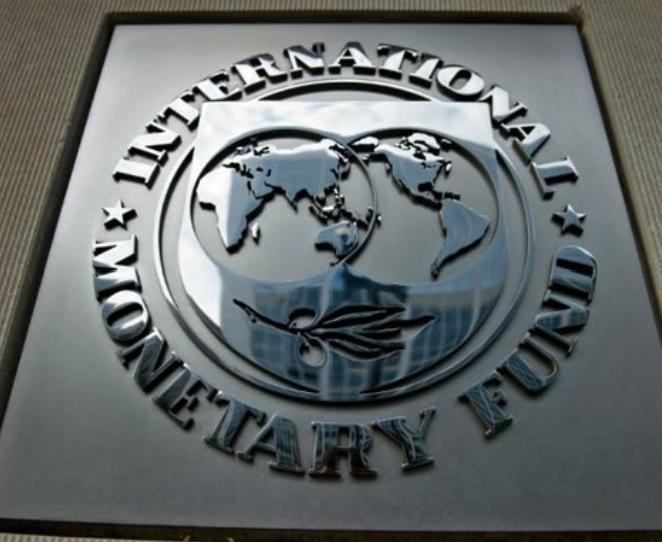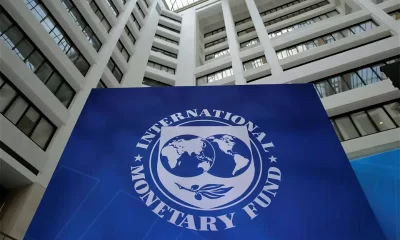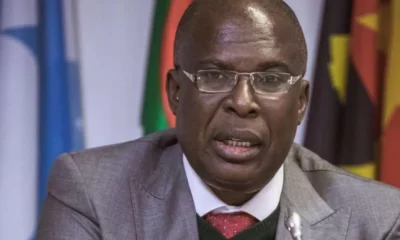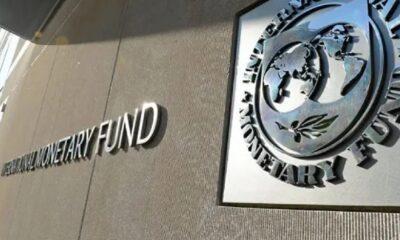Business
Uncertainties Might Persist Amid High Risks To Financial Stability – IMF
Published
2 years agoon
By
Editor
Amid the continued tension necessitated by the Russia-Ukraine war and the post-COVID-19 pandemic effect, the International Monetary Fund warned on Sunday that risks to financial stability have increased following the recent sector in the financial industry.
Speaking at the China Development Forum in Beijing, IMF Managing Director Kristalina Georgieva said she expected 2023 to be another challenging year.
Her position is based on the rate of global growth slowing to below 3.0 per cent due to the war in Ukraine, monetary tightening and scarring from the pandemic.
READ ALSO: IMF Warns CBN, Others Over Rising Inflation
She also stressed the need for vigilance despite the high risks.
She said, “Uncertainties are exceptionally high, with the outlook for the global economy likely to remain weak over the medium term. It is clear that risks to financial stability have increased.”
You may like


2024: Top 10 African Countries With The Highest Debt To IMF


Africa Gains Third Seat On IMF Board


VIDEO: Reject IMF, World Bank Offers – Falana Cautions FG


IMF Denigrates Nigeria’s Economic Growth


Bayelsa Guber: Why Court Disqualified APC Candidate, Sylva


IMF Retains Nigeria’s Economic Growth Forecast At 3.2%
Business
JUST IN: Dangote Refinery Hikes Petrol Ex-depot Price
Published
2 weeks agoon
June 20, 2025By
Editor
Nigerians may soon pay more for petrol as the Dangote Petroleum Refinery on Friday increased its ex-depot price for Premium Motor Spirit to N880 per litre, raising fresh concerns over fuel affordability and price volatility in the downstream sector.
Checks on petroleumprice.ng, a platform tracking daily product prices, and a Pro Forma Invoice seen by The PUNCH confirmed the hike, representing a N55 increase from the previous rate of N825 per litre.
The increment would ripple across the entire fuel distribution chain, likely pushing pump prices above N900/litre in some parts of the country, especially in areas far from the distribution hubs.
The hike comes despite global crude prices falling. Brent crude dipped by 3.02% to $76.47, WTI fell to $74.93, and Murban dropped to $76.97 on Friday. The decline in benchmarks offers little relief due to persistent fears of sudden supply disruptions.
READ ALSO: JUST IN: Dangote Refinery Sashes Petrol Gantry Price
The refinery has increased its reliance on imported U.S. crude and operational costs amid exchange rate instability, which adds to its pricing pressure.
On Thursday, the President of the Dangote Group, Aliko Dangote, said his 650,000-barrel capacity refinery is “increasingly” relying on the United States for crude oil.
This came as findings showed that the Dangote Petroleum Refinery is projected to import a total of 17.65 million barrels of crude oil between April and July 2025, beginning with about 3.65 million barrels already delivered in the past two months, amid ongoing allocations under the Federal Government’s naira-for-crude policy.
Dangote informed the Technical Committee of the One-Stop Shop for the sale of crude and refined products in naira initiative that the refinery was still battling crude shortages, which had led it to resort to imports from the United States.
READ ALSO:Dangote Stops Petrol Sale In Naira, Gives Condition For Resumption
On Monday, the president of the Petroleum and Natural Gas Senior Staff Association of Nigeria, Festus Osifo, accused oil marketers of exploiting Nigerians through inflated petrol prices, insisting that the current pump price of PMS should range between N700 and N750 per litre.
He criticised the disparity between falling global crude oil prices and the stagnant retail price of petrol in Nigeria.
“If you go online and check the PLAT cost per cubic metre of PMS, convert that to litres and then to our Naira, you will see that with crude at around $60 per barrel, petrol should be retailing between N700 and N750 per litre.”
He asserted that if Nigerians bear the brunt of higher fuel costs, they should be allowed to enjoy the benefit of low pricing.
His forecast of increased costs now appears spot on, considering the latest developments.
Marketers are already adjusting. Depot owners and fuel distributors in Lagos and other cities anticipate a domino effect, with new price bands expected to follow Dangote’s lead.
Many had held back pricing decisions since Tuesday, when the refinery halted sales and withheld fresh PFIs. The delay fueled speculation, allowing opportunistic price hikes across various depots.

The Naira, which has seen steady appreciation against the Dollar all week, closed stronger on Friday, trading at ₦1,580.44 in the official forex market.
Data from the Central Bank of Nigeria’s website show the Naira gained ₦4.51k against the Dollar on Friday alone.
This marks a 0.28 per cent appreciation from Thursday’s closing rate of ₦1,584.95 in the official foreign exchange window.
The local currency maintained consistent strength throughout the week, recording gains daily.
READ ALSO: Naira Appreciates Against Dollar At Foreign Exchange Market
On Monday, May 19, it traded at ₦1,598.68; on Tuesday, at ₦1,590.45; and on Wednesday, at ₦1,584.49.
These gains suggest increased investor confidence and improved forex supply, contributing to the naira’s performance.
Meanwhile, the CBN, at its 300th Monetary Policy Committee meeting held Monday and Tuesday, retained the Monetary Policy Rate at 27.5 per cent.
Business
BREAKING: Again, Dangote Refinery Cuts Petrol Price
Published
1 month agoon
May 22, 2025By
Editor
The Dangote Petroleum Refinery has announced a nationwide reduction in the pump price of Premium Motor Spirit (PMS), commonly known as petrol, with new prices now ranging between ₦875 and ₦905 per litre, depending on location.
The ₦15 per litre cut applies across all regions and partner fuel stations, and was confirmed via an official announcement posted on Dangote Refinery’s social media channels on Thursday.
Major marketers participating in the new pricing regime include MRS, Ardova, Heyden, Optima Energy, Techno Oil, and Hyde Energy — partners in the distribution of Dangote-refined products.
READ ALSO: JUST IN: Dangote Refinery Sashes Petrol Gantry Price
Under the previous pricing structure, Lagos residents paid ₦890 per litre, while prices reached ₦920 in the North-East and South-South regions. With the latest adjustment, Lagos now pays ₦875 per litre, while the North-East and South-South will see prices drop to ₦905.
A regional breakdown of the revised prices is as follows: Lagos: ₦875, South-West: ₦885, North-West & Central: ₦895, North-East & South-South: ₦905 and South-East: ₦905.
In its announcement, Dangote Refinery encouraged consumers to purchase fuel only from authorised partner stations and urged the public to report any cases of non-compliance via its official hotlines: +234 707 470 2099 and +234 707 470 2100.
“Our quality petrol and diesel are refined for better engine performance and are environmentally friendly,” the company said.
- NDLEA Arrests Warri Chief, Ayirimi Emami’s Brother For Alleged Drug Smuggling
- Lagos Suspends BRT Lane Enforcement On Eko Bridge, Odo Iya-Alaro
- Lagos Opens Teacher Recruitment Portal For Two Weeks
- Coalition: Otti Speaks On Report Of Leaving LP
- Coalition Won’t Be Easy, But We’re Ready – Mark
- Ekiti Court Remands Man Over Alleged Threat To Life
- Coalition: Why ADC Leaders Stepped Down — Nwosu
- Ex-minister Amaechi Dumps APC, Says Tinubu Can’t Govern Nigeria
- FG Unveils N50m Grant To Boost Student Innovation, Entrepreneurship
- Customs Intercept 111 Live Parrots, Illicit Drugs In Adamawa, Taraba
About Us
Trending

 News3 days ago
News3 days agoAuchi Poly Mass Comm Class of 2006 Holds Maiden Reunion in Benin

 Headline3 days ago
Headline3 days ago‘They Checked My Instagram’ – Nigerian Lady Breaks Down After Landing In U.S, Denied Entry

 Metro3 days ago
Metro3 days agoBREAKING: Emir’s Palace, NDLEA Office Set Ablaze As Protest Rocks Kwara

 Metro2 days ago
Metro2 days agoPanic As Bees Invade Central Mosque In Edo

 News4 days ago
News4 days agoPHOTOS: Esama Of Benin Commissions BRC Ultramodern Lounge, Promises A Phase Lift

 News3 days ago
News3 days agoJUST IN: Court Grants Natasha Bail On Self-recognition

 News3 days ago
News3 days agoIndecent Dressing Punishable Offence, Attracts N50,000 Fine In Delta — Police Warns

 News4 days ago
News4 days agoNSCDC, Immigration, Others: FG Postpones Recruitment, Changes Portal

 News3 days ago
News3 days agoNiMet Predicts 3-day Thunderstorms, Rains

 News1 day ago
News1 day agoSenator Withdraws From Legislative Duties Over Health Challenge


























